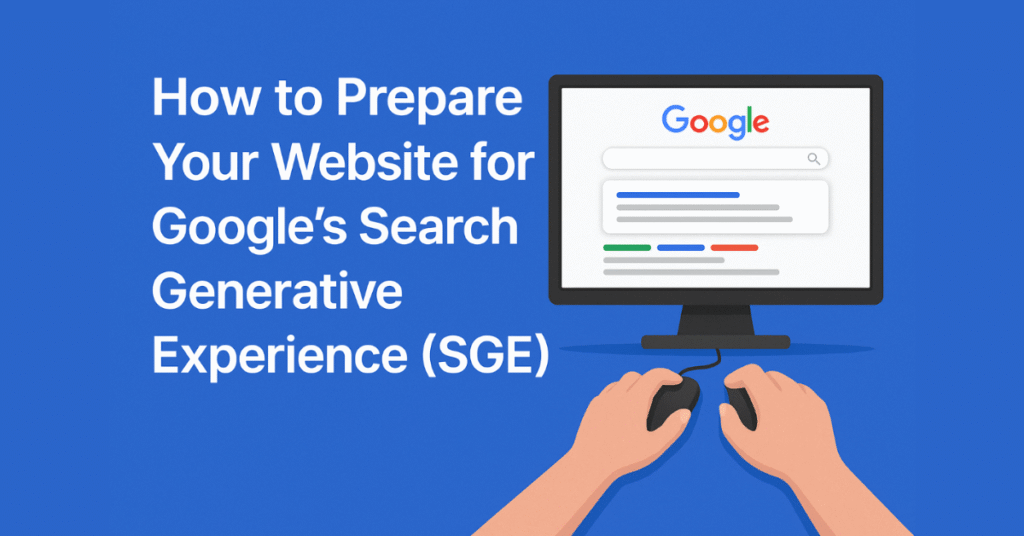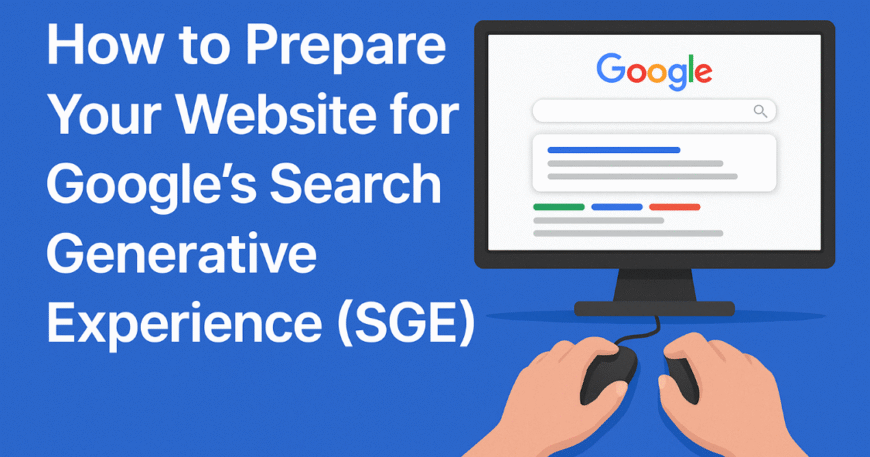
Table of Contents
- Introduction: What is Google’s Search Generative Experience?
- Why SGE Matters for Website Owners
- Key Changes Brought by SGE
- Content Strategy for SGE
- SEO Best Practices in the SGE Era
- Technical Recommendations
- E-E-A-T and SGE: Strengthening Your Authority
- Monitoring & Adapting to SGE Insights
- FAQs
- Final Thoughts
1. Introduction: What is Google’s Search Generative Experience?
Google’s Search Generative Experience, or SGE, is a new AI-powered feature being integrated into Google Search. Instead of displaying a list of ten blue links, SGE offers an intelligent, conversational overview of a topic. It synthesizes information from multiple sources and presents users with a concise answer to their query, often followed by related questions or suggested paths for deeper exploration. In essence, it mimics a chat-like search assistant but is integrated into the traditional search experience. This marks a major shift in how content is discovered and consumed on the web.
2. Why SGE Matters for Website Owners
For businesses and creators, SGE represents a critical shift in how visibility is earned online. The traditional SEO strategies focused on ranking in the top few positions of organic results. But with SGE, users may find answers directly from the AI summary, reducing clicks to individual websites. This means that being cited as a trustworthy source within those summaries becomes a new benchmark for visibility. If your content does not make it into the AI’s synthesized output, it risks being overlooked. Therefore, understanding and preparing for SGE is essential for maintaining traffic and authority in this evolving landscape.
3. Key Changes Brought by SGE
SGE introduces a new search interface where AI-generated answers take precedence. Users are presented with contextual summaries that pull content from multiple sources, which are sometimes hyperlinked in a subtle manner. The format is more interactive, often including follow-up prompts and related queries that resemble a chat experience. Another noticeable change is that Google’s emphasis shifts from simply indexing keywords to understanding the depth and trustworthiness of the content. Sites that lack clarity, structure, or authority are less likely to be used in the AI-generated responses. As such, search becomes more dynamic, contextual, and user-intent driven.
4. Content Strategy for SGE
To adapt your content strategy for SGE, it’s important to focus on building genuine topical authority. This means moving away from creating standalone articles on trending keywords and instead developing a well-connected ecosystem of content that deeply covers a subject. Think of your website as a resource hub rather than a place for keyword-based content generation. Your writing should answer questions clearly and directly, using natural language that aligns with how people actually speak and search. Also, content should anticipate follow-up questions and provide layered value. The more helpful and contextually rich your page is, the more likely it is to be referenced by SGE.
5. SEO Best Practices in the SGE Era
Even though the format of search results is evolving, foundational SEO practices remain relevant. Google still relies on structured signals to understand and prioritize content. However, in the context of SGE, clarity of language and content hierarchy take on greater importance. Your pages should be organized with strong heading structures, contain well-defined answers to likely user questions, and feature summaries or insights that can be easily parsed by AI. Instead of writing solely for ranking, content should aim to educate and guide. Additionally, snippets of concise and well-written answers within your content are more likely to be picked up by generative AI as cited excerpts.
6. Technical Recommendations
Preparing for SGE also requires ensuring that your website is technically optimized. Site performance metrics such as load speed, mobile responsiveness, and accessibility contribute directly to how your content is valued by Google. Pages that take too long to load or rely heavily on JavaScript can hinder AI models from extracting information effectively. It is also essential to implement clean HTML structures that allow search engines to interpret content without confusion. Technical SEO elements such as structured data and internal linking should be maintained with precision, as they help the AI understand relationships and content context more accurately.
7. E-E-A-T and SGE: Strengthening Your Authority
Google’s Search Generative Experience leans heavily on the E-E-A-T framework—Experience, Expertise, Authoritativeness, and Trustworthiness. Websites that exhibit these qualities are more likely to be cited by the AI in its summaries. You should ensure that your authors are clearly identified, their credentials are visible, and content includes personal or professional insight when relevant. Backing your claims with credible sources, including testimonials, case studies, or third-party endorsements, also improves your perceived authority. Transparent practices, such as clear contact information, privacy policies, and secure browsing, contribute to the trustworthiness signals that Google values.
8. Monitoring & Adapting to SGE Insights
Tracking your site’s performance in an SGE-dominated search environment is still a developing area. However, tools like Google Search Console and Google Analytics can offer indirect insights. For instance, you may notice an increase in impressions with a lower click-through rate, indicating your content is being surfaced but not clicked—likely due to SGE answers appearing above. It’s important to continuously monitor engagement metrics, update your most visited pages with clearer summaries, and adapt your content based on observed user behavior. Experimentation and agile content strategy will help you stay aligned with the evolving search experience.
9. FAQs
Q: How does SGE decide which websites to cite?
SGE looks for high-quality content that demonstrates experience, relevance, and authority on the topic. It uses a blend of structured data, semantic understanding, and user intent to determine which sources to surface.
Q: Can I track if my content appears in SGE summaries?
Currently, there are no dedicated tools to track SGE citations. However, patterns in impression and engagement data may provide hints, and it’s expected that Google will eventually roll out more detailed analytics.
Q: Should I change all my content to target SGE?
No, you don’t need to overhaul everything. Start by optimizing high-traffic or high-value pages. Focus on clarity, depth, and trust signals, and expand your efforts over time.
Q: Does SGE mean SEO is dead?
Absolutely not. If anything, SEO has become more nuanced and valuable. While traditional ranking factors are evolving, the core goal of SEO—creating content that meets user needs—remains the same.
10. Final Thoughts
Google’s Search Generative Experience marks a fundamental transformation in how users interact with search results. Rather than relying on clicks and keywords alone, success in this new era will be defined by depth, trust, and context. Preparing for SGE means not only refining your content but also elevating your authority, optimizing technically, and aligning your strategies with real human intent. Those who adapt early will not only retain visibility but gain a competitive edge as search continues to evolve in favor of quality and user-first experiences.




